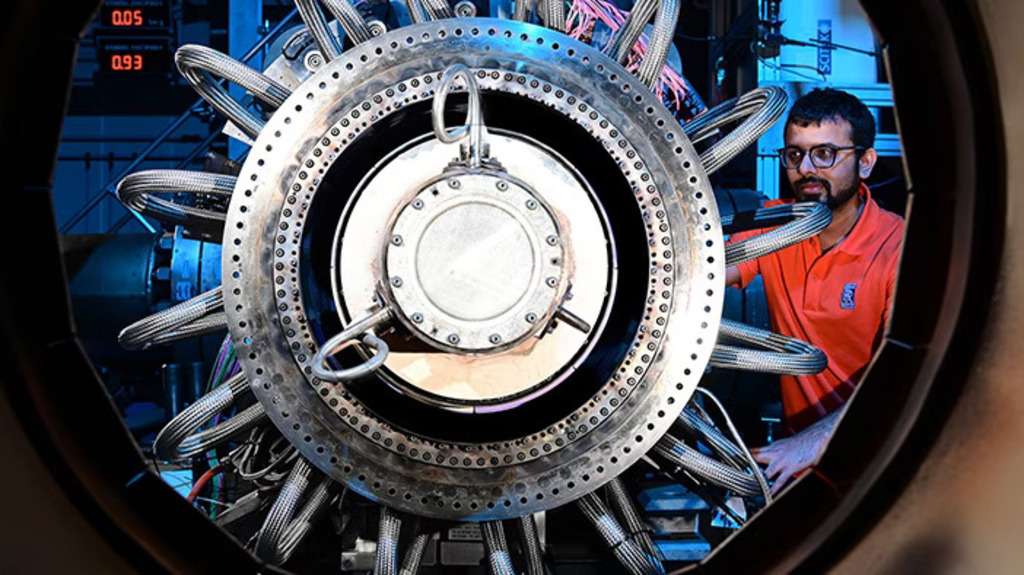Renowned British engineering company, Rolls-Royce has recently shared some exciting news regarding it’s pioneering hydrogen research project.
Rolls Royce has been working in partnership with low-cost airline easyJet, Loughborough University, and the German Aerospace Centre (DLR) to develop hydrogen combustion engine technology for future aircraft.
Pearl 700 Testbed
Recently, they conducted tests on the combustor of a state-of-the-art Pearl 700 engine at DLR in Cologne, running the engine on 100% hydrogen.
The results from the test have proven that “fuel can be combusted at conditions that represent maximum take-off thrust” – a first for the fuel source. Rolls-Royce has said the outcome “marks another significant step in the journey to enabling hydrogen as an aviation fuel”.
This recent breakthrough brings the aviation industry one step closer to utilizing hydrogen as a sustainable aviation fuel.
[monsterinsights_popular_posts_inline]

One of the major challenges of using hydrogen as a fuel is its high temperature and rapid burning. But the brilliant minds behind the project have successfully overcome this obstacle by designing “advanced fuel spray nozzles”.
These innovative nozzles effectively control the combustion process, ensuring safe and efficient hydrogen combustion as confirmed in the recent test.
Stakeholder Comments
Professor Dan Parsons, Pro Vice-Chancellor for Research and Innovation, Loughborough University, commented on this:
“In conjunction with its partners, the National Centre for Combustion and Aerothermal Technology (NCCAT) at Loughborough is delighted to have supported the landmark testing and development of advanced aerospace fuel spray nozzles utilizing hydrogen fuel. This is a major advance towards net zero aviation.”
Grazia Vittadini, Chief Technology Rolls-Royce, commented: “This is an incredible achievement in a short space of time. Controlling the combustion process is one of the key technology challenges the industry faces in making hydrogen a real aviation fuel of the future.”
“We have achieved that, and it makes us eager to keep moving forward. I want to thank easyJet, Loughborough University and DLR for their dedication and support to reach this milestone.”

easyJet has been a keen advocate of hydrogen technology. Both Rolls Royce and Easyjet have shared their confidence that by the “mid-2030s -hydrogen combustion engine technology (will be) capable of powering a range of aircraft, including those in the narrow-body market segment.”
This is good news for easyJet, who operate an all-Airbus narrow-body fleet. Last year, easyJet and Rolls-Royce also set a world first by successfully running a modern aero engine, an AE2100, on green hydrogen at Boscombe Down, UK.
Johan Lundgren, CEO of easyJet, noted: “We believe hydrogen is the future of short-haul aviation and the success of this test and progress being made demonstrates that this is becoming ever closer.”
“We remain optimistic that it will play a critical role in helping us achieve the ambitious goals we set out in our net zero roadmap.”
Hydrogen as a fuel source
Hydrogen is now widely known as a clean and sustainable energy source. When burned, the only byproduct is water vapor, which means no harmful emissions.
This makes it an excellent alternative to traditional fossil fuels and a step towards reducing the carbon footprint of the aviation industry.
This achievement by Rolls-Royce and its partners is not only a testament to their technical expertise but also a testament to their commitment to finding innovative solutions to reduce the environmental impact of aviation.
It’s an inspiring example of how collaboration and ingenuity can drive positive change.

Click the banner to subscribe to our weekly newsleter.









